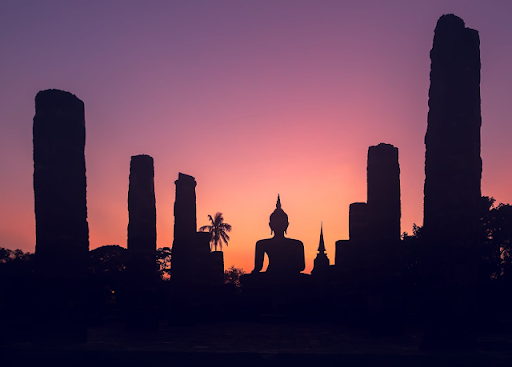The Six Perfections... Mahayana Buddhism
The Six Perfections in Practice
Each of the Six Perfections supports the other five, but the order of the perfections is significant also. For example, the first three perfections--generosity, morality, and patience--are virtuous practices for anyone. The remaining three--energy or zeal, meditation, and wisdom--are more specifically about spiritual practice.
1. Dana Paramita: Perfection of Generosity
In many commentaries on the Six Perfections, generosity is said to be an entry way to the dharma. Generosity is the beginning of bodhicitta, the aspiration to realize enlightenment for all beings, which is critically important in Mahayana.
Dana paramita is a true generosity of spirit. It is giving from sincere desire to benefit others, without expectation of reward or recognition. There must be no selfishness attached. Charity work done to "feel good about myself" is not true dana paramita.
2. Sila Paramita: Perfection of Morality
Buddhist morality is not about unquestioning obedience to a list of rules. Yes, there are precepts, but the precepts are something like training wheels. They guide us until we find our own balance. An enlightened being is said to respond correctly to all situations without having to consult a list of rules.
In the practice of sila paramita, we develop selfless compassion. Along the way, we practice renunciation and gain an appreciation for karma.
3. Ksanti Paramita: Perfection of Patience
Ksanti is patience, tolerance, forbearance, endurance, or composure. It literally means "able to withstand." It is said there are three dimensions to ksanti: the ability to endure personal hardship; patience with others; and acceptance of truth.
The perfection of ksanti begins with acceptance of the Four Noble Truths, including the truth of suffering (dukkha). Through practice, our attention turns away from our own suffering and toward the suffering of others.
Accepting truth refers to accepting difficult truths about ourselves--that we are greedy, that we are mortal--and also accepting the truth of the illusory nature of our existence.
4. Virya Paramita: Perfection of Energy
Virya is energy or zeal. It comes from an ancient Indian-Iranian word that means "hero," and it is also the root of the English word "virile." So virya paramita is about making a courageous, heroic effort to realize enlightenment.
To practice virya paramita, we first develop our own character and courage. We engage in spiritual training, and then we dedicate our fearless efforts to the benefit of others.
5. Dhyana Paramita: Perfection of Meditation
Dhyana, Buddhist meditation is a discipline intended to cultivate the mind. Dhyana also means "concentration," and in this case, great concentration is applied to achieve clarity and insight.
A word closely related to dhyana is samadhi, which also means "concentration." Samadhi refers to a single-pointed concentration in which all sense of self falls away. Dhyana and samadhi are said to be the foundations of wisdom, which is the next perfection.
6. Prajna Paramta: Perfection of Wisdom
In Mahayana Buddhism, wisdom is the direct and intimate realization of sunyata, or emptiness. Very simply, this is the teaching that all phenomena are without self-essence or independent existence.
Prajna is the ultimate perfection that includes all other perfections. The late Robert Aitken Roshi wrote:
"The Sixth Paramita is Prajna, the raison d'être of the Buddha Way. If Dana is the entry to the Dharma, then Prajna is its realization and the other Paramitas are Prajna in alternate form." (The Practice of Perfection, p. 107)
That all phenomena are without self-essence may not strike you as especially wise, but as you work with prajna teachings the significance of sunyata becomes more and more evident, and the importance of sunyata to Mahayana Buddhism cannot be overstated. The sixth paramata represents transcendent knowledge, in which there is no subject-object, self-other dualism at all.
However, this wisdom cannot be understood by intellect alone. So how do we understand it? Through the practice of the other perfections--generosity, morality, patience, energy. and meditation.


Comments
Post a Comment
RN USA no longer accepts comments. The information presented is for reflection, contemplation, and for those seeking greater understanding and wisdom. It is for seekers and those with an open mind and heart.
Namaste